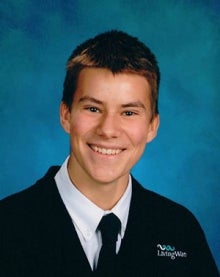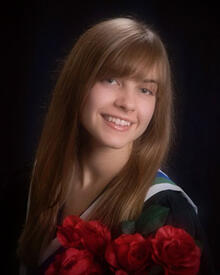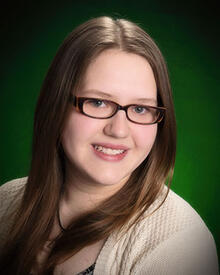Waterloo welcomes top students from across Canada
Schulich Leader scholarship winners have done it all - from competing in international robotics championships to founding a humanitarian group
Schulich Leader scholarship winners have done it all - from competing in international robotics championships to founding a humanitarian group
By Suzanne Bowness Marketing and Strategic CommunicationsThey are travelling from as close as Oakville, Ontario and as far away as Coquitlam, British Columbia, but this year’s Schulich Leader scholarship winners were all drawn to the Univeristy of Waterloo by its reputation for innovation, high standards, and entrepreneurial spirit.
For some, calling Waterloo home will mean the realization of a lifelong dream:
“Since Grade 6, I've wanted to go to Waterloo because I heard that it was one of the best engineering schools in Canada,” says Ella Rasmussen, of Oakville, who will be joining the mechanical and mechatronics engineering program. “I also thought that the co-op opportunity was one of the best things that could happen for an engineering student.”
Madeline Shred of Ladysmith, B.C., will be a student in Waterloo’s biomedical sciences program. “I'm really interested in Waterloo's reputation for innovation,” says Shred. “In today's economy and world, it’s innovation that's going to help us create a better future.”
The Schulich Leader Scholarship program awards $60,000 to undergraduate students whose focus is science, technology, engineering or math. Students also should demonstrate financial need and leadership in areas like academic excellence or business and entrepreneurship. This year’s winners fulfil the requirements, with averages ranging from 94 to 99 percent, and extracurriculars that include everything from volunteering for humanitarian organizations to participating in competitive sports.
Mechanical Engineering, Faculty of Engineering
 Graduating with a 98 percent average, Aaron Grenke will arrive at Waterloo from Spruce Grove, Alberta, having already tasted six weeks of university life as a WISEST Summer Researcher in a University of Alberta nutrition lab. He’s also volunteered internationally through a Rotary Club-sponsored humanitarian trip to Guatemala, and given back to his school by using his tenure as vice-president of the student council to spearhead a mentorship program for younger students.
Graduating with a 98 percent average, Aaron Grenke will arrive at Waterloo from Spruce Grove, Alberta, having already tasted six weeks of university life as a WISEST Summer Researcher in a University of Alberta nutrition lab. He’s also volunteered internationally through a Rotary Club-sponsored humanitarian trip to Guatemala, and given back to his school by using his tenure as vice-president of the student council to spearhead a mentorship program for younger students.
Grenke says he wanted to expand his horizons beyond his home province, and is particularly intrigued by Waterloo’s co-op offering. “I’m really excited about having a hands-on approach to learning, especially with the co-op term. It should expand my personal horizons, and open my eyes. I’m really excited to be able to work alongside my education and see how it fits.”
Mechatronics Engineering, Faculty of Engineering
 A robotics competitor since Grade 6, Ella Rasmussen co-founded and co-captained a team that took home 15 awards from regional, provincial, and international events in its 2013-2014 season. The Oakville, Ontario resident has already worked for world-renowned engineering company Hatch as an intern, taught programming fundamentals to children through an organization called Ebots Robotics, organized technology meetups in her area, and attended the prestigious SHAD program. After SHAD, she led a group of alumni to create a startup company called WeeSprout that combines environmental sustainability with food nutrition and community.
A robotics competitor since Grade 6, Ella Rasmussen co-founded and co-captained a team that took home 15 awards from regional, provincial, and international events in its 2013-2014 season. The Oakville, Ontario resident has already worked for world-renowned engineering company Hatch as an intern, taught programming fundamentals to children through an organization called Ebots Robotics, organized technology meetups in her area, and attended the prestigious SHAD program. After SHAD, she led a group of alumni to create a startup company called WeeSprout that combines environmental sustainability with food nutrition and community.
Rasmussen says that she’s excited to attend Waterloo because it speaks to her own entrepreneurial spirit, and also offers opportunity for international learning. “One thing that I wanted to do with co-op was experience different co-ops around the world. For example, I've been teaching myself German so that I can go to a co-op in Germany, which I think would be pretty cool,” she says.
Biomedical sciences, Faculty of Science
 Graduating with a 99 percent average, Ladysmith, BC-based Madeline Shred has already tested out the university waters by enrolling in psychology and journalism courses while still finishing grade 12. She’s participated in the SHAD program, volunteers at her local hospital and other causes, and belongs to her city’s youth advisory council. She helped found a charitable organization called Building a Legacy at her school, which raised money for Free the Children.
Graduating with a 99 percent average, Ladysmith, BC-based Madeline Shred has already tested out the university waters by enrolling in psychology and journalism courses while still finishing grade 12. She’s participated in the SHAD program, volunteers at her local hospital and other causes, and belongs to her city’s youth advisory council. She helped found a charitable organization called Building a Legacy at her school, which raised money for Free the Children.
Shred says that becoming named a Schulich Leader means a lot. “It's unbelievable. It's validated how much hard work I've put into school and my community. This made it seem like all my hard work was worth it.”
Kinesiology, Faculty of Applied Health Sciences
 Rising regularly before dawn to hit the rink in her hometown of Coquitlam, Cindy Wei is a competitive skater who attained the silver levels in both free skate and ice dance; won medals in many competitions, and performed in ice dancing shows. She gives back to that community as a CanSkate assistant coach and learn-to-skate instructor for the City of Coquitlam, where she received its first ever “instructor of the season” award. She also cross-trains in aerial gymnastics.
Rising regularly before dawn to hit the rink in her hometown of Coquitlam, Cindy Wei is a competitive skater who attained the silver levels in both free skate and ice dance; won medals in many competitions, and performed in ice dancing shows. She gives back to that community as a CanSkate assistant coach and learn-to-skate instructor for the City of Coquitlam, where she received its first ever “instructor of the season” award. She also cross-trains in aerial gymnastics.
Wei holds executive positions in several clubs, and volunteers as a peer tutor, literacy tutor and nurse's aide for her local hospital. She’s written two children's novels and is cultivating a readership for her cooking/nutrition blog.
For Wei, landing at Waterloo will not only expand her geographic horizons (it’s her first time in Ontario), but her creative opportunities. “I ended up choosing Waterloo because it's such an innovative university and the environment there seems very welcoming. It's a place where I can be creative and develop my ideas further.”

Read more
Here are the people and events behind some of this year’s most compelling Waterloo stories

Read more
Meet the 13 exceptional students representing Waterloo’s newest grads

Read more
Special issue of Waterloo Magazine celebrates women who lead, and explores equity in education and the workplace
The University of Waterloo acknowledges that much of our work takes place on the traditional territory of the Neutral, Anishinaabeg, and Haudenosaunee peoples. Our main campus is situated on the Haldimand Tract, the land granted to the Six Nations that includes six miles on each side of the Grand River. Our active work toward reconciliation takes place across our campuses through research, learning, teaching, and community building, and is co-ordinated within the Office of Indigenous Relations.